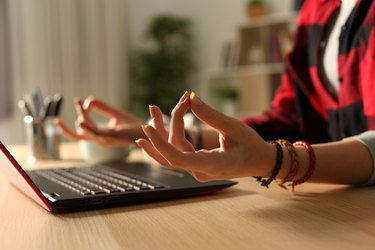
At this point in the COVID-19 pandemic, even homebodies are feeling a bit strained by the confines of quarantine. Keeping busy in positive ways can help reduce stress for some. But for others, slowing down instead may be just the thing to soothe your soul.
To that end, meditation may be a good habit to add to your day.
Video of the Day
Never tried it before? No worries. Here's the lowdown on how it can help, along with expert tips on how to start and stick with a meditation practice.
The Big Benefits of Meditation
There's a good deal of research to back up the positive effects of meditation.
A study in the March 2014 issue of JAMA Internal Medicine, for example, concluded that meditation decreases anxiety.
A few months later, in July of 2014, research published in PLOS One found that the practice appears to reduce inflammation. And in June 2016, the Annals of the New York Academy of Sciences reported on a study that showed regular meditation increases the body's immune response.
Related Reading
Of particular note, with so many of us bummed about canceled travel plans: Meditation can have a longer-lasting effect on diminishing stress than relaxing on a vacation, according to Harvard Health Publishing.
Especially when our societal norms and regular routines have been upended by COVID-19, experts agree that the perks of meditation shouldn't be underestimated.
"Meditation can help quiet the anxious thoughts in your head, so you feel more clear-headed and focused," says Heidi McBain, LMFT, a licensed counselor in the Arlington, Texas, area who works with women to maximize the therapeutic benefits of meditation.
Michelle Berninger, a doula and Head of Customer Experience at Expectful, an app focused on meditation during pregnancy and early parenthood, adds that "improved sleep quality is possibly the most important benefit of meditation right now." It can both help you fall asleep and go back to sleep if you wake up in the middle of the night, she says.

How to Meditate for Beginners
Ready to find your zen? Incorporating meditation into your lifestyle is paramount to long-term success, McBain says. Here are the three steps to follow:
1. Pick a time to meditate each day, and stick to it. "It's all about consistency," McBain says. The time of day you choose is less important and largely a matter of personal preference.
"Morning meditations are a wonderful way to set intentions and do some energizing breathing for the day ahead," Berninger says. "A nightly meditation, on the other hand, is perfect for calming the mind."
2. Start small. "I advise my clients to start with a short amount of time each day, and build from there," McBain tells LIVESTRONG.com.
How short? It depends on the kind of meditation you're doing. "If you're listening to a guided meditation, you may be fine starting with five to 10 minutes per day. However, if you're doing a quiet meditation where you set a timer and focus on your breath, more than two or three minutes might feel challenging," McBain says.
3. Choose a comfortable position. As with the time of day, there are no right or wrong answers here. "It could be sitting, lying down, moving through gentle stretches or even taking a walk through nature," Berninger says. "The more relaxed and at ease your body is, the better."
Related Reading
3 Common Challenges You Can Conquer
As a meditation newbie, you're likely to experience one or more of the following pitfalls, according to McBain. But you can beat them with a little preparation.
You get confused about choosing a type of meditation, and stall before you even get started. Meditation routines aren't all alike. Mindfulness, guided imagery, body scan and 4-7-8 breathing are popular varieties. As a beginner, picking a lane might feel overwhelming.
Educate yourself on the differences between meditation techniques, then try a couple that appeal to you. "I like people to try a variety of meditation types before they throw themselves into one," McBain says.
There are quite a few guided meditation apps out there, too; aside from Expectful, you might also check out Headspace or Insight Timer.
"While [apps] can be a boon to some, they aren't the right avenue for everyone," McBain says. "Plenty of people prefer prefer a short, quiet meditation, while a set breathing technique might be what's right for others."
You get frustrated when you lose focus, unable to "turn off your brain." "This is so normal, especially at the beginning of a brand new meditation practice," McBain assures. "Meditation is a learned skill."
Keep in mind that there will always be days when keeping focus is harder than it is on other days, no matter how long you've been doing this. "Just gently remind yourself to refocus on your breath every time your mind wanders — and that you're not the only one struggling in this area right now!"
You start making excuses about not having the time. Setting a time of day and prioritizing this "appointment" with yourself will put you in the best position to jump this hurdle right out of the gate.
If you're still tempted to skip your session, it may not be because you're too busy.
"It can be hard to commit to something new each and every day. Might this excuse really be about the energy needed to meditate? It isn't easy to put yourself in a vulnerable space routinely, especially one in which you don't yet feel confident," says McBain.
The solution is straightforward: Keep at it, and you'll grow more comfortable. "With practice, it gets easier and easier," McBain says.
Soon, you'll be looking forward to your next meditation session, instead of looking for a reason to avoid it.
- Heidi McBain: "Relieve Anxiety"
- Harvard Medical School: "Regular meditation more beneficial than vacation"
- Annals of the New York Academy of Sciences: "Mindfulness meditation and the immune system: a systematic review of randomized controlled trials"
- PLOS One: "The effects of mind-body therapies on the immune system: meta-analysis"
- Jama Internal Medicine: "Meditation programs for psychological stress and well-being: a systematic review and meta-analysis"
- Headspace
- Insight Timer
- Calm
- Expectful
Is this an emergency? If you are experiencing serious medical symptoms, please see the National Library of Medicine’s list of signs you need emergency medical attention or call 911.